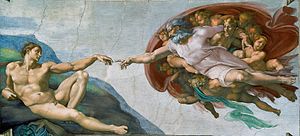When reading the first chapter of Genesis it is good to ask
questions. Perhaps not so much to get answers, but rather, to open ourselves up
to different ideas. God’s creation is described in this book, which begins
with:
“In the beginning God created the heavens and the earth.” Gen 1:1
We delved into the meaning of this text in Who or What is God?
Towards the end of chapter 1, after the outer world was
‘created’, we come to the first mention of human beings.
“So God created man in his own image, in the image of God he created him; male and female he created them.” Gen 1:27
We should take this text literally, “male and female he created them.” In other words, in the beginning
human beings were male AND female, not male OR female. In other words, these
human beings were hermaphrodites. Human beings didn’t become male or female
until the rib story in Chapter 2.
So the LORD God caused a deep sleep to fall upon the man, and while he slept took one of his ribs and closed up its place with flesh; and the rib which the LORD God had taken from the man he made into a woman and brought her to the man. Gen 2:21-22
The big question to ask now is this. Did life as we know it
start in the Garden of Eden? Is this the beginning and end of God’s creation?
At the same time, we should also ask: when Eve spoke to the snake and surrendered
to temptation was that really the downfall of the human race? See Genesis 3
The Expulsion of Adam and Eve from Paradise JOHN MARTIN (1789–1854)
The main problem with understanding what actually took place
is that we think that human beings were the same then as they are now. How
could that possibly be! For a start, who can talk to snakes now? Seriously, we
need to understand the true evolution of the human being in body, soul and
spirit. St Paul gives us
many clues in Corinthians 15. Let’s take a closer look at verses 44 to 46.
If there is a natural body, there is also a spiritual body. Thus it is written, "The first man Adam became a living being"; the last Adam became a life-giving spirit. But it is not the spiritual which is first but the natural, and then the spiritual. 1 Cor 15:44-46
In the Greek it actually says if there is body soma and soul psuche, there is also spirit pneuma.
The word natural is not there. Then it says that the first man, protos anthropos, became a living soul, zao psuche. This describes a soul that
is alive and breathing and we could take it to mean that the first Adam was
able to exist for the first time in the atmosphere of this physical earth as
soul-being with a physical body that breathes. Paul tells us that this is a
crucial step in the process, the first step.
The last Adam, which is a reference to Christ crucified,
became spiritually alive, pneuma
zoopoioun. So this story tells us in detail about the evolutionary process
of human beings pointing out that God’s creation evolves. If we are to fully
understand ourselves as members of the human race, we need knowledge about how
these three areas; body, soul and spirit, function. There is a process going on
in which we can participate.
At this stage in our evolution we are very aware of our
body, our senses are alive and we spend a lot of time seeking physical pleasure
– from food, from contact with others, by keeping comfortable and warm etc. We
have a dim awareness of our soul, as if in a dream, and we are mostly unaware
of our spirit. Until we can wake up our soul and become consciously aware of
its functioning, we will never be able to experience the life-giving spirit of
which Paul speaks. It took me 25 years of study and six years of writing to put
this information into a format that we can work with in our daily life – you
will find it in my book I Connecting.
If we ever wonder what is wrong in the world today it is
that these guiding principles are virtually unknown. Once we start to work with
these three areas of our being, we have greater control of the way we respond
to life bringing us to the experience of true freedom. This is why St John
reports Jesus’ words in Jn 8:32 “you will know the truth, and the truth will
make you free.” (See full quote Jn 8:30-32) Another road to freedom is to
become aware of the principles the disciples represent in our being [link]. Then
we will understand the ways in which God’s Creation evolves.
If you are interested in interpretations of the bible see Kristina's books on Amazon



